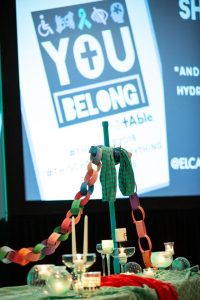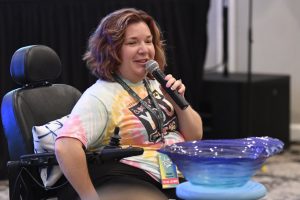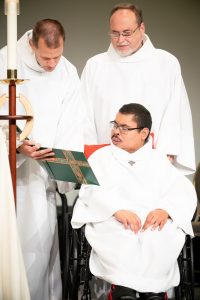Today’s post is written by Anita Smallin, Youth Family Ministry Director at Trinity Lutheran Church, North Bethesda, Maryland and Rev. Lisa Heffernan, Pastor at Trinity Lutheran Church, Chamberlain, South Dakota.
When we come before God in worship, we bring our whole selves. What does that actually mean? For many people in the ELCA it means coming to worship with the assistance of a mobility, audio, visual, or sensory device. Unfortunately, in many of our churches or places of worship, it is our siblings in Christ who have disabilities and need such devices who feel the least welcome at the table. Why? A lack of ramps, elevators, or braille or large print worship resources are not the only or first obstacle encountered. Many times it is the language used when talking about or concerning disability that is problematic or unwelcoming to many.
Talking about disability can feel awkward sometimes. The language doesn’t feel right. We often don’t know what to say or how to speak publicly in our liturgy, sermons, and prayers. At times we will fall into the trap of affirming who a person is “despite” their disability, rather than simply honoring who they are: A beloved child of God. Whole, complete. Just as they are. What needs to change in our approach? Where do hospitality and authentic welcome to worship begin?

Using person-first language is a great place to start. This language is meant to acknowledge that a person is not their diagnosis or disability in a negative way. It reminds us that someone is a person first and foremost, whose identity is rooted in being a child of God. Also, in person-first language, we avoid language that talks about suffering, or that victimizes or infantilizes the person. For example: a wheelchair bound person vs. a person who uses a wheelchair.
Disability Ministries has prepared a document that can help us think about how to use person-first language in worship, and in the whole of our lives together. The document helps us understand what person-first language is and provides examples for how it can be used in worship. It also serves as a reminder to us that language around disability is constantly evolving and is often contextual.
Disability vs. varied ability vs. differently abled
“For myself (Lisa Heffernan), terms like varied ability and differently abled wrap up disability into too nice of a little bow. This language feels condescending to me. I have a disability. I own it. I’m okay with it. This is how I was made. Yes, we all have varied and different abilities. I am a paraplegic. I use a wheelchair. Saying I have a disability does not take away my identity or sense of self and who God made me to be. “Varied” and “Differently abled” don’t own that part of who I am enough for me. I am not “disabled”; my wheelchair and spina bifida do not hinder my life. They, largely, make it the gift it is. I have a disability, and that’s ok. The self I bring to worship has a disability, but is not broken or ‘less than’ because of it.”
We hope this document is a starting point or a conversation starter as we work toward making our worship and the language we use in it more inclusive and barrier–free. Our language isn’t perfect, but we serve a God who guides us as we come together as the whole body of Christ where all are truly welcome.

Images: from The tAble 2018; ELCA Churchwide Assembly 2019
